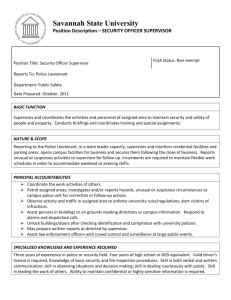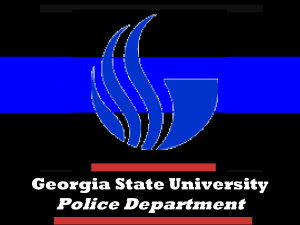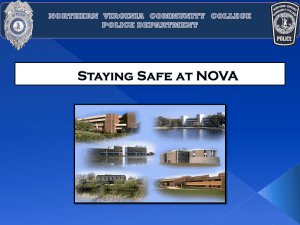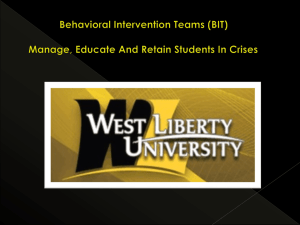2013-14 - Academic Senate
advertisement
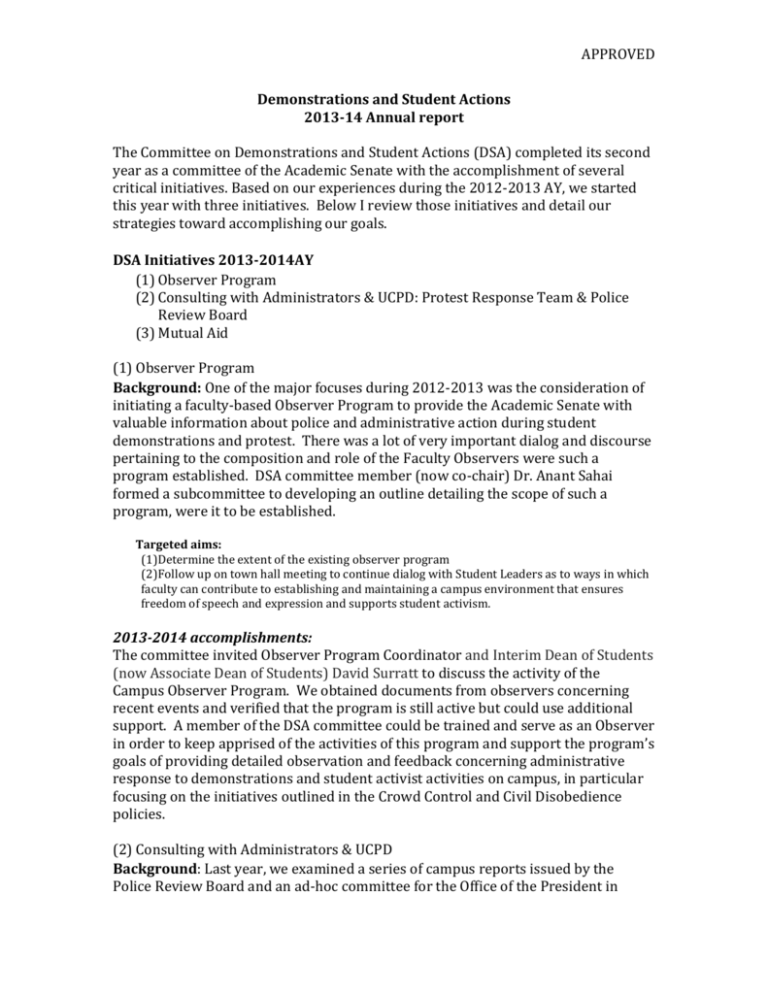
APPROVED Demonstrations and Student Actions 2013-14 Annual report The Committee on Demonstrations and Student Actions (DSA) completed its second year as a committee of the Academic Senate with the accomplishment of several critical initiatives. Based on our experiences during the 2012-2013 AY, we started this year with three initiatives. Below I review those initiatives and detail our strategies toward accomplishing our goals. DSA Initiatives 2013-2014AY (1) Observer Program (2) Consulting with Administrators & UCPD: Protest Response Team & Police Review Board (3) Mutual Aid (1) Observer Program Background: One of the major focuses during 2012-2013 was the consideration of initiating a faculty-based Observer Program to provide the Academic Senate with valuable information about police and administrative action during student demonstrations and protest. There was a lot of very important dialog and discourse pertaining to the composition and role of the Faculty Observers were such a program established. DSA committee member (now co-chair) Dr. Anant Sahai formed a subcommittee to developing an outline detailing the scope of such a program, were it to be established. Targeted aims: (1)Determine the extent of the existing observer program (2)Follow up on town hall meeting to continue dialog with Student Leaders as to ways in which faculty can contribute to establishing and maintaining a campus environment that ensures freedom of speech and expression and supports student activism. 2013-2014 accomplishments: The committee invited Observer Program Coordinator and Interim Dean of Students (now Associate Dean of Students) David Surratt to discuss the activity of the Campus Observer Program. We obtained documents from observers concerning recent events and verified that the program is still active but could use additional support. A member of the DSA committee could be trained and serve as an Observer in order to keep apprised of the activities of this program and support the program’s goals of providing detailed observation and feedback concerning administrative response to demonstrations and student activist activities on campus, in particular focusing on the initiatives outlined in the Crowd Control and Civil Disobedience policies. (2) Consulting with Administrators & UCPD Background: Last year, we examined a series of campus reports issued by the Police Review Board and an ad-hoc committee for the Office of the President in APPROVED 2008-2011. Those reports offered dozens of detailed recommendations for improved administration and police department response to campus protest activities, but it was not clear in our conversations with officials whether the majority of these recommendations had been implemented or whether there were even plans in place to initiate their implementation. We prioritized items that the committee felt were essential to maintaining freedom of expression and assembly on campus. Targeted aims: Protest Response Team – The PRT was developed following the November 9 2011 protests by campus leadership, replacing the CMT. The Police Review Board report on November 9 2011 details the function and response of the CMT during the Nov. 9 events and the subsequent development of the PRT, and details (in Appendix C) the PRT roles. DSA has been asked to provide a representative to the PRT, and discussions by the DSA throughout Spring 2013 indicated interest with caution. Points of Discussion / Suggested Actions: (1) We need to determine our desired role in contributing faculty voice to the PRT and determine if we can play that role in the context of their offer. To this end, we could invite Ann Jeffrey (staff, PRT) to Oct or Nov meeting to discuss the role of the PRT. (2) Write up role of DSA liason to the PRT and initiate dialog with PRT members/Chancellor to see if our goals are consistent with their invitation to membership/presence. UCPD – One of the senate goals when establishing the DSA was to open communication between faculty representatives and the UCPD. Former DSA Chair MacCoun was invited to be present during the hiring of the new police chief, and there is clear interest on behalf of the current Police Chief to communicate with faculty and provide a framework for feedback between faculty and the police, particular in defining police action during demonstrations on campus. Points of Discussion / Suggested Actions: (1) The police review board (PRB) has responsibilities above and beyond demonstrations and protests; do we want to have any input to PRB activities that are specific to protests, and would we want to state that collaboration prior to an event so that a mechanism is in place? (2) Invite police chief to Oct or Nov meeting. (3) In collaboration with police chief, come up with a series of recommendations for developing a specific and detailed plan of action (including escalation) for response to protests; establishing a clear and transparent chain of command that is specific to the needs of the campus community; incorporating civilian oversight from administrative and faculty ranks. 2013-2014 accomplishments: (1) At our December meeting we hosted Protest Response Team members Ann Jeffrey (Wilton’s chief of staff), EVCP George Breslauer and VCAF John Wilton. Breslauer and Wilton co-chair the PRT. We reviewed the PRT charter and discussed at length the principles that guide PRT. We reviewed the 12 month report that the PRT prepared for the UCOP, highlighting efforts and accomplishments to changes in campus practices related to protest responses, as mandated by the UCOP in response to the Brazil and Robinson-Edley reports. We also received from Ann Jeffrey the full document tracking Berkeley’s list of all Robinson-Edley Report recommendations and their status. Since this time, the report has been submitted and all recommendations have been addressed. Academic Senate leadership is well represented on the PRT, obviating the need to have a member of DSA directly on the PRT. However, mechanisms for communication between the PRT and DSA was not APPROVED directly established and should be considered essential if the DSA is to remain active as a senate committee. (2) Police Chief Bennett attended our October meeting. Prior to the meeting we presented her with a list of questions pertaining to escalation of force, mutual aid, and police policy for responding to demonstrations on campus. We had a long and productive discussion in which she referred to the new policies on Crowd Control and demonstrated (as did the PRT) the incorporation of a ‘wait and see’ policy, catering police action to the exact situation at hand with efforts taken to maintain open dialog and communication and to involve local parties (department chairs, deans, faculty, etc). She also, as did the PRT, emphasize that no police action would be taken without administrative presence on the ground. (3) Professor Emeritus Robert Cole (Law) was invited to the April meeting to share his considerable knowledge about the First Amendment, freedom of expression, and civil disobedience within the broad context of a university campus. His presentation was grounded in the historical and political framework that sparked the Free Speech Movement and that continues to resonate at Berkeley 50 years later. (3) Mutual Aid Background: Our investigations suggested that a major source of concern for both campus-wide safety and freedom of expression is the “mutual aid” practice by which our police department recruits neighboring departments for assistance in times of need. We received somewhat conflicting descriptions about whether the University has a clear and unambiguous chain of command in these cases, and whether there are adequate safeguards to ensure that neighboring police departments consistently comply with the campus standards regarding appropriate circumstances and methods for the escalation of force. Targeted Goal: The 2011-2012 committee agreed unanimously that one area in which we could have a major influence and impact on campus policy safeguarding academic freedoms during demonstrations and student actions would be through a study of the police policies associated with mutual aid. We have support from UC Berkeley’s Goldman School of Public Policy to develop a study of mutual aid policies and practices nationally as part of their Introduction to Policy Analysis as a client-based project. 2013-2014 accomplishments: DSA committee members Robert Dudley and Deborah Blocker submitted a proposal to the GSPP to undertake a student project to study mutual aid policies. Unfortunately, though extremely insightful and well developed, the proposal was not selected by any of the current students for a group project. Further enquiries concerning the basis of the proposal's rejection yielded no response, nor was the proposal selected in the 2nd round by a masters student. Communication with a faculty member in GSPP similarly yielded no further insight into this situation. For 2014-2015, we plan to work more closely with GSPP to prepare our proposal and to APPROVED ascertain ahead of time those factors which might predispose selection by a student group. In our discussion with Police Chief Bennett, we determined that mutual aid was considered a last resort by the UCPD, with police from other UC campuses first in line to respond if local campus police felt the need. It is also clear that UC training is specific to campus policies and that, if brought on campus, Berkeley and Oakland police forces are acting under the UC police guidelines but will still respond given their non-UCPD training practices. Conclusions Overall, we have accomplished all goals relating to our three main initiatives this year. We feel that open lines of communication and an atmosphere of mutual respect can be established given the attention to detail regarding police/administration/student interactions and the implementation of the recommendations brought forth by the Robinson-Edley report. After the events of Fall 2011, the UC Berkeley administration introduced many key reforms to its handling of protests, and shared the underlying principles with us. The most important features are: 1) The campus recognizes that unless violence is imminent or the university's core academic mission is being seriously disrupted, in general the best response to a protest/demonstration is to watch carefully, engage in an open dialog, and let the demonstration play itself out. Patience is a virtue. 2) Unless violence is immediate and police must respond in the moment to defend themselves or to protect others, all police action against student demonstrators shall be undertaken with a senior administration official present at the scene. 3) Decisions regarding what to do regarding a localized disturbance on campus shall be taken with the input and consultation of the local units impacted by the disturbance. 4) The campus recognizes and has clearly stated (see Regulations Concerning Time, Place and Matter of Public Expression) that it has a special obligation to protect free inquiry and free expression. On University grounds open to the public generally, all persons may exercise the constitutionally protected rights of free expression, speech and assembly. Such activities must not, however, interfere with the right of the University to conduct its affairs in an orderly manner and to maintain its property, nor may they interfere with the University's obligation to protect the rights of all to teach, study, and freely exchange ideas. APPROVED 5) In general, demonstrations that play themselves out peacefully will not be referred for either criminal prosecution or the student conduct process. For the coming year, we feel that it is essential for the committee to increase our participation in multiple campus-wide initiatives in order to ensure that the policies on crowd control continue to ensure an environment that promotes freedom of expression, with a particular focus on playing a positive role in developing a clear campus-wide policy concerning civil disobedience and freedom of speech.
